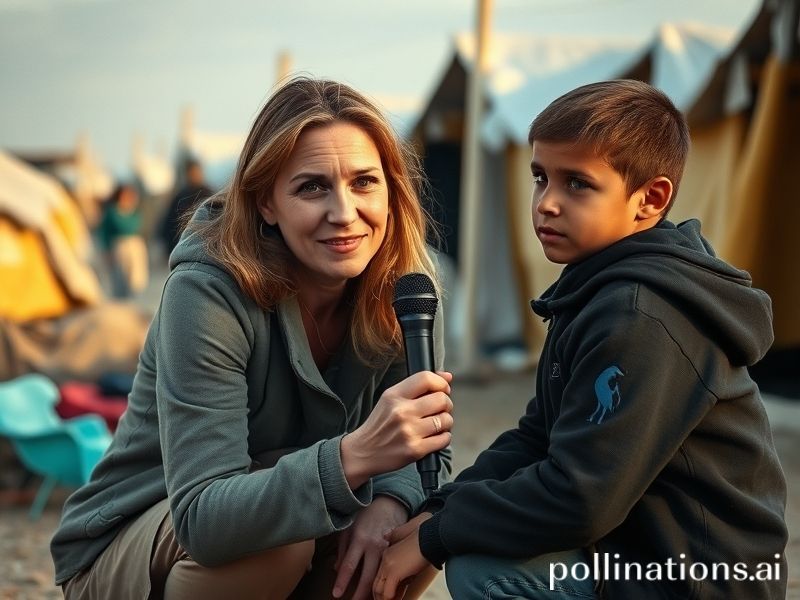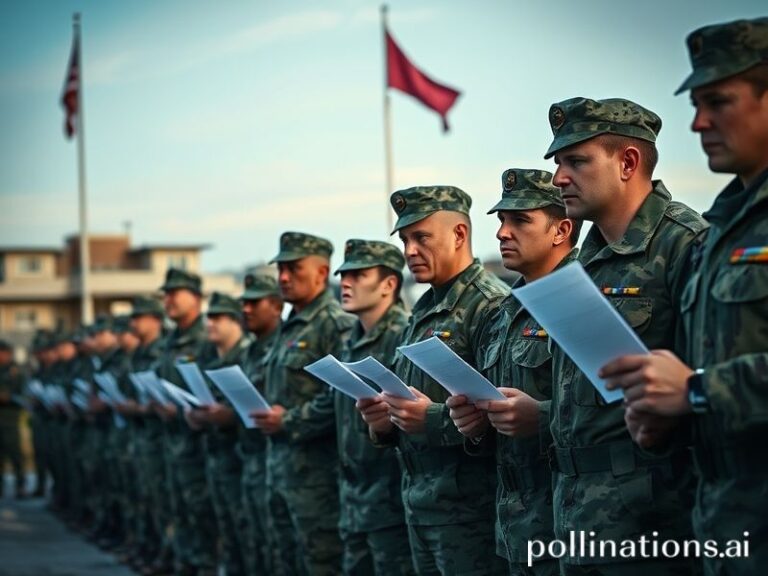Stacey Doley: The UN’s Unlikely Reality-TV Envoy to the World’s Worst Places
Stacey Doley: How a Former Luton Checkout Girl Accidentally Became the UN’s Favourite Reality-TV Witness
PARIS—Sometime between the Brexit referendum and the first TikTok war, the planet quietly agreed to outsource global conscience to a 37-year-old former hairdresser from Bedfordshire. Stacey Doley—once famous primarily for winning Strictly Come Dancing and having a surname that sounds like a Dickensian euphemism for poverty—has, without anyone really noticing, become the West’s most unlikely foreign correspondent. From sweatshops in Cambodia to ISIS brides in Syria, she’s turned the BBC’s glossy documentary machine into a kind of brightly lit confessional booth where the developing world files its complaints against the rest of us.
The arrangement works like this: Doley flies in with a tiny crew, asks the sort of questions that make warlords momentarily forget their talking points, and leaves with footage so disarmingly polite it somehow feels more damning than a UN tribunal. The UN, in fact, seems to agree; in 2018 it handed her a “Global Advocate” badge, presumably because all the career diplomats were busy arguing over the lunch menu. Now, whenever a new atrocity is trending, someone in Geneva apparently sighs, “Send for Stacey,” as though she were a one-woman peacekeeping force with better cheekbones.
International audiences have responded with the sort of bewildered gratitude normally reserved for UNHCR blankets. In South Korea, streaming services subtitle her documentaries as “healing content,” a phrase that sounds dystopian if you think about it for more than three seconds. Meanwhile, American viewers binge her back catalogue between episodes of The Real Housewives, enjoying the cognitive dissonance of watching Congolese cobalt miners before returning to an Apple product assembled from, well, Congolese cobalt. Call it guilt offsetting for the streaming age.
The cynical among us might note that Doley’s brand of empathy is perfectly calibrated for the Instagram era: trauma wrapped in soft lighting, atrocity with a pastel filter. Yet the softness is the point. Where veteran war correspondents show up looking like they’ve slept in a trench (because they have), Doley arrives resembling your most well-meaning friend who’s just discovered Fairtrade coffee. It’s hard to accuse someone wearing a £29 Zara blouse of colonial voyeurism—even if that blouse was probably stitched by the very hands she’s interviewing. The irony is so pure it could be bottled and sold at Whole Foods.
Global institutions have taken note. The World Bank reportedly screens her films at staff retreats, presumably between PowerPoints on fiscal sustainability. NGOs use her clips in donor pitches, aware that nothing loosens Western purse strings like a photogenic Brit visibly distressed by child labour. Even China’s state media has offered backhanded praise, calling her “naïve but useful”—the diplomatic equivalent of patting a Labrador on the head.
Of course, the real significance lies in what happens after the credits roll. Each documentary spawns a flurry of petitions, parliamentary questions, and LinkedIn think-pieces titled “What Stacey Taught Me About Supply Chains.” Whether any of it reduces actual suffering is another matter; Britain still sells arms to half the regimes she visits, and fast-fashion CEOs remain stubbornly at liberty. But somewhere in Luton, a teenager who once dreamed of contouring tutorials now wants to investigate textile slavery, which is either progress or the perfect encapsulation of late capitalism’s ability to commodify even its own critique.
In the end, Stacey Doley may be less a journalist than a global coping mechanism: a secular saint for a world that outsources morality to television personalities because institutions have stopped bothering. We watch, we sigh, we retweet #BeMoreStacey, and then we order next-day delivery. Meanwhile, the planet keeps spinning on its axis of exploitation, comforted—if only for an hour—by the gentle sound of a Home Counties accent asking, “So, how did you lose your childhood?”







